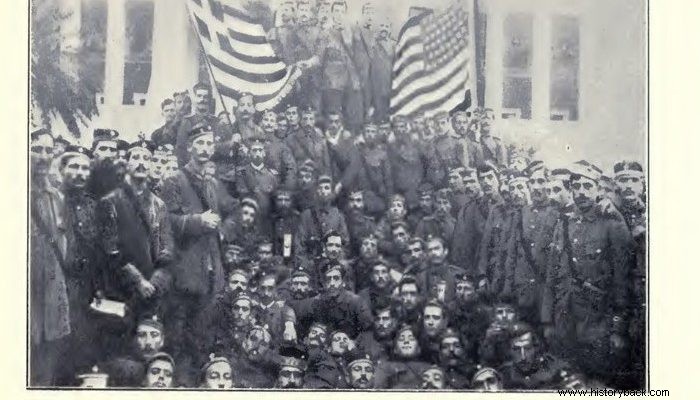
February 21, 1913 is a historical anniversary for Greece which connects Crete with Epirus. On this day Ioannina was liberated and the Cretans played their own historical role. It was not only Eleftherios Venizelos, who as prime minister contributed the most to this sacred cause, but also the "Holy League of Cretan Students", which participated in all the heroic battles for the liberation of Epirus.
Dr. SOTIRIS KAMENOPOULOS
Venizelos himself, on October 14, 1912, handed over to Infantry Lieutenant Colonel Lambros Synaniotis the flag of the Regiment that took part in the battles of Five Wells (October 24-27), Peston (October 29) and from December 1912 to February 21, 1913 in legendary and deadly battles of Aetorachi, Manoliasa and Bizani. Cretan warriors of Synaniotis heard the cry "AERA" for the first time.
The Cretan volunteers created 77 bodies with a strength of 3,500 men led by Gyparis, Hippitis, Kyriakos Mitsotakis, Deligiannakis, Makris, Skoulas, Manos and others. Another 3,500 Cretans formed the Independent Cretan Regiment under Lieutenant Colonel Synaniotis.
In October 1912, the Sacred Company of Cretan Students arrived in Preveza with 240 (according to others 250) students who joined the Epirus Army (of these Amoustaka heroes, 160 fell dead during operations) and the Company of Cretan Teachers who joined in the Constitution of Hippo.
Kostis Kapidakis, volunteer law student in the "Holy League of Cretan Students" and later head of the Secretariat of the Court of Appeal of Crete, writes:"Of the 1,400 men of the Order that had joined the League of Students, 567 remained alive. The other 833 had fallen in the field of Battle and the Battalion was organized in Dilochia".
The "Holy Company of Cretan Students" belonged to the 1st Cretan Battalion of the Independent Cretan Regiment. The priest Ioannis K. Hatzidakis and later an agronomist, in his book "Warrior Heroes" in 1927, gives us a complete and concise picture of the organization and action of this heroic company:
"The Cretan Volunteer Company was made up of 250 students, who, abandoning their desks, rushed immediately after the declaration of the Balkan Wars to spontaneously shed their blood as Hierolohitai of 1821, in favor of the liberation of our brothers suffering under the Turkish yoke . He took part from beginning to end in the giant battle of the Epirotikos Agonus.
"They played a major role in the battle of Pest, capturing two cannons - the first to enter Pest... On February 21, 1913, the day of Byzantium's surrender, they were facing him and at a distance of only 200 meters. But also the document of the surrender of the Ioannina was deposited in their hands. And because of them, he was transferred to General Headquarters...".
The high point of the participation and contribution of the Cretans for the liberation of Macedonia and Epirus during the Balkan Wars of 1912-1913 are the students of Chania High School. A volunteer body was also created by the Greek Redcoats known as the Garibaldians of Riciotis Garibaldis who came from Italy.
The Corfu parliamentarian and poet Lorenzos Mavilis, who, recovering from his fatal injury at the Drisco of Ioannina on November 23, 1912, said the immortal phrase:"I did not hope for such an honor, to give my life for the Greece".
On hearing of the war, 225 bachelors stationed in America formed the Holy Lodge of Philadelphia, known as the Lodge of Americans. They gave up everything in order to contribute to the Motherland. With the financial assistance of the Epirotians there, they chartered a passenger ship, bought 4 field cannons and armament and in November 1912 they joined the Independent Cretan Regiment of Synaniotis. Half of them were killed in Aetorachi of Ioannina.
Kritikopoulos has a mental battle with Bizaniou's back
He has no mother to cry for him, no master to feel sorry for him,
neither brother nor sister to feel sorry for him,
only the corporal du and he feels sorry for him.
Another story unknown to many involves the name Thomas Setzer Hutchison. This name may not mean anything special to many Greeks. Thomas Setzer Hutchison was an American soldier (brigadier general) who participated in 1912 in the battles of Byzantium for the liberation of Ioannina from the Ottomans. Brigadier General Thomas Setzer Hutchison belonged to the National Guard and was from Tennessee, USA.
During a visit to New York, Brigadier General Hutchison found himself in front of a moving scene where Greek-American volunteers were preparing to leave for Greece to participate in the battles for the liberation of the Ioannina people. Hutchison did not hesitate for a moment and volunteered.
Hutchison fought in Byzantium side by side with Greek soldiers (and Cretan volunteers perhaps?) where he was wounded. Hutchison even met with Eleftherios Venizelos in Athens a few days before going to Bizani. When Brigadier General Hutchison returned to the US in 1913, he published a book entitled "An American soldier under the Greek flag at Bezanie".
Honor and glory from the Greeks both to the Cretan volunteers and to the hero American citizen, as we do for all those who fought alongside us in the Nation's struggles.
As an Epirotian by origin, driven from Ioannina, I too express my everlasting deep gratitude to all these heroic Cretans and to the American Brigadier General Hutchison, who together gave their lives for the liberation of Ioannina, my hometown. And I hum the lyrics to the following two folk songs:
"We took the Ioannina, many eyes say it, many eyes say it where they laugh and cry. They call it birds of Grevena and nightingales of Metsovo, where they were shadowed by the frost and shiver of fear. The claps and the thunder say it, the bells say it, the happy mothers and the black-clad mothers say it too".
"It's cold in Pest and Bizani, my mother. In Pesta in Manoliasa we couldn't take our breath away. Bullets and cannons don't scare me, mother. I'm only afraid of the frost, of Bizani the snows". IMMORTAL!
